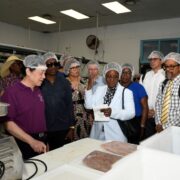FAO promotes women training in fisheries to face economic crisis in the Caribbean
Black Immigrant Daily News
The Director-General of the Food and Agriculture Organization of the United Nations (FAO), QU Dongyu met and interacted with local fisherfolk and women of the Central Fish Processors Association, during his visit to the Bridgetown Fishing Complex in Barbados yesterday.
As part of his agenda during his first visit to the Caribbean, the Director General learned about the details of the implementation of a FAO supported fish silage project. This initiative aims to assist women working in the small-scale fisheries to generate an alternative source of income through the production of animal feed derived from the fish silage. Transforming fish waste into valuable resources with potential for income streams is critical to empowering women and bolstering the spirit of entrepreneurship.
QU stated, “The circular economy is ideal in Barbados as you have sugar cane. You have the residue from the sugar cane, which you can compost to make organic fertilizer and use it to grow vegetables, and you can mix it in with manure. So that’s another cycle”.
The fish silage project is part of the initiative “Promoting the circular economy in fisheries value chains to support sustainable livelihoods”, and seeks to generate alternative measures to promote food and nutrition security while reducing imports of feed and fertilizers, for example.
QU also saw the process for preparing and processing fresh tuna fish for export.
Adrian Forde, Minister of the Environment and National Beautification, Green and Blue Economy in his brief remarks indicated that he was “happy to be part of something like this; something great that we are doing as it relates to a circular economy and ensuring there is sustainable development of our fisherfolk”.
Milton Haughton, Executive Director of Caribbean Regional Fisheries Mechanism (CRFM) also presented during the meeting along with several local pig and small ruminant farmers who gave first hand positive experiences in using the fish silage pellets.
Shelly-Ann, Chief Fisheries Officer of the Bridgetown Fisheries Complex stated she was happy to host the FAO Director-General and the high-level delegation from FAO, and added that Ministry was exploring innovation in the silage project together with FAO and other stakeholders.
Donate At Caribbean News Service, we do not charge for our content and we want to keep it that way. We are seeking support from individuals and organisations so we can continue our work & develop CNS further.
NewsAmericasNow.com







